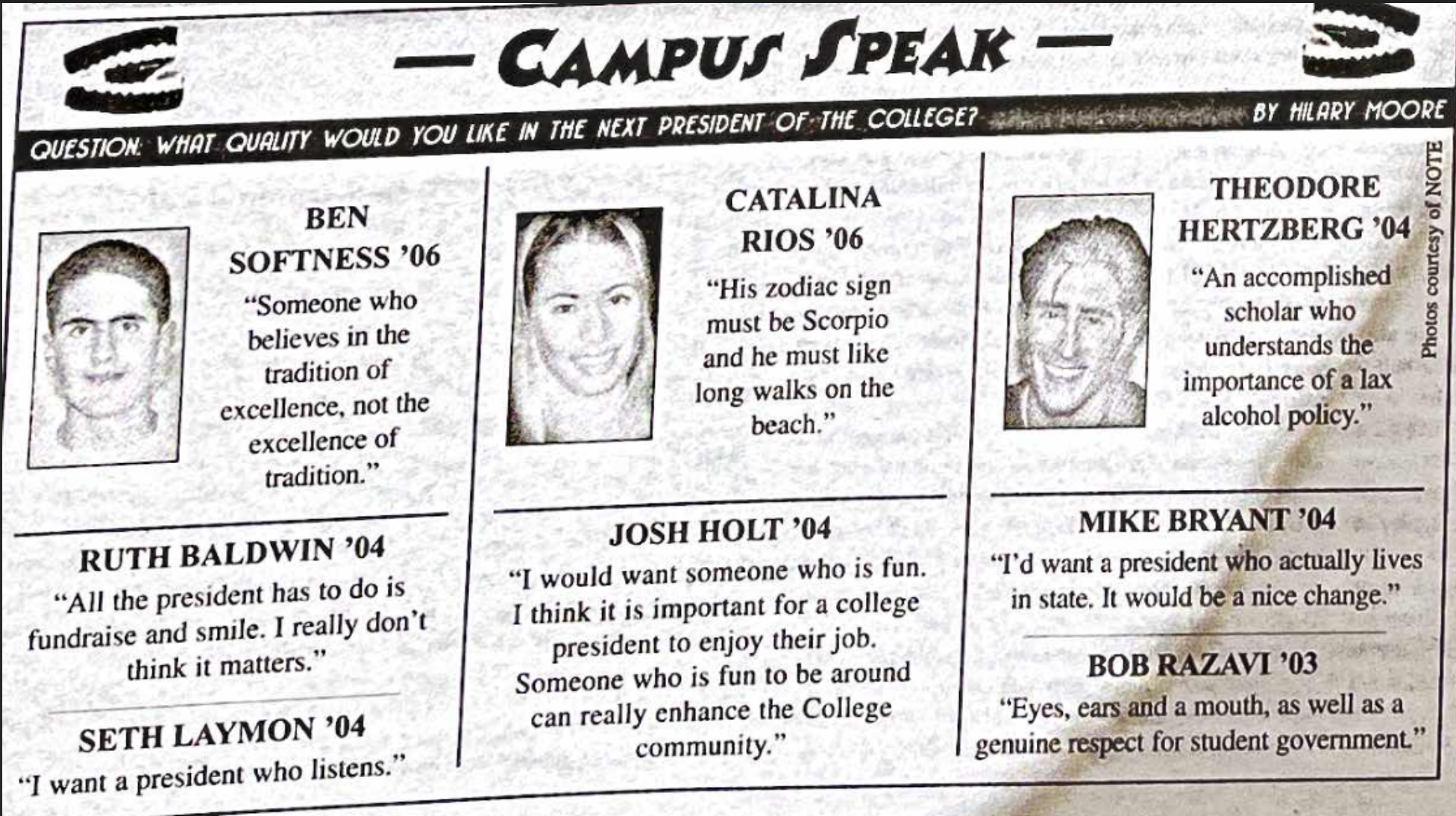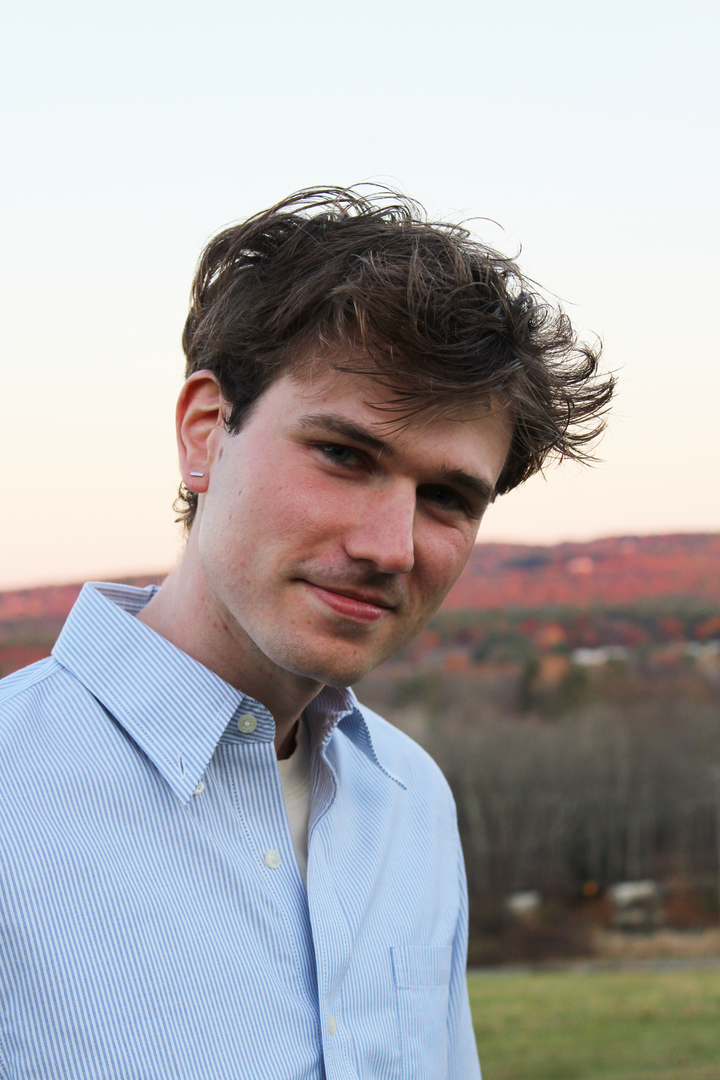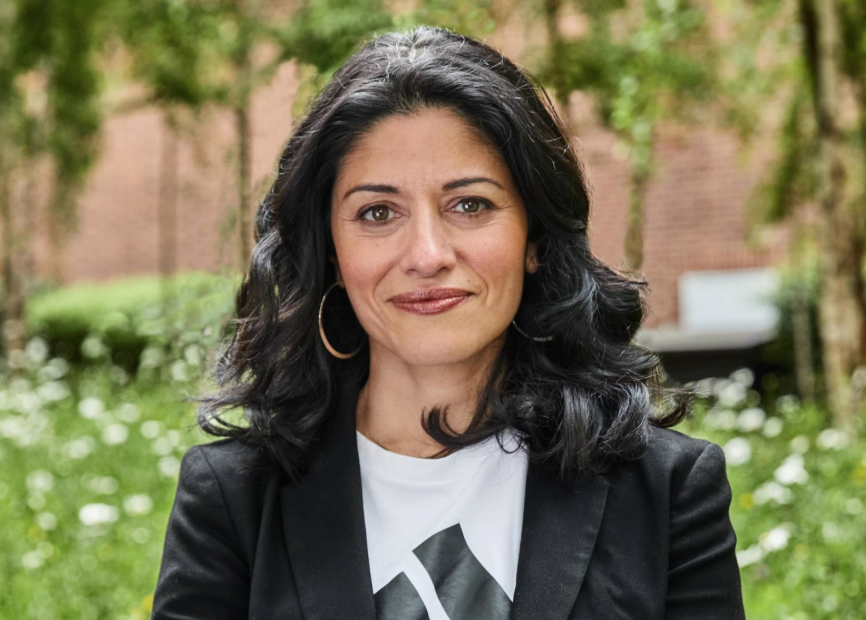Old News: This Week in 2002
In this week’s Old News, Managing Features Editor Sonia Chajet Wides ’25 explores the Oct. 9, 2002 edition of The Student, which covered a statement on antisemitism, a lack of gender diversity in AAS, and custodial cleanup post-dorm parties. Sound familiar?
Welcome back to Old News! In this column, I use a random number generator to select a year in the college’s history, and take a look at The Student’s issue from this week in that year. My hope is to make our past feel more tangible, to help us understand this place a little better, and to explore the role of The Student in cataloging history. Read more about this project in my first column here.
This week’s year: 2002
This Old News is the most recent edition I’ve looked at yet, and it shows: many professors and staff members mentioned in its pages still work at the college, like Aliki Perroti and Seth Frank ’55 Professor of International Relations Pavel Machala and William H. Hastie ’25 Professor of Political Science Thomas Dumm, and ACPD Chief John Carter.
The Oct. 9, 2002 edition of The Student gives us a peek into campus in the early aughts: a Eurotrash party, news briefs on George W. Bush and Iraq, and discussions of Islamophobic sentiment post-9/11. The fall semester of 2002 also saw a rise in crime on and off campus, from car break-ins to theft to vandalism.
As always, there are topics that feel strikingly familiar to fall 2024. In this 2002 edition, The Student reported on controversy over the president’s decision to sign a statement on antisemitism and support for Israel. Opinion pieces addressed gun control and diversity on campus. One article reported on the custodial staff’s cleanup of dorms after weekend parties. And there were discussions of a lack of women among the first-year AAS senators.
President signs American Jewish Committee’s “intimidation-free campus” statement, sparking controversy
“Gerety signs controversial statement” read the front page of this issue of The Student. The headline referenced then-college President Tom Gerety, who signed a statement written by the American Jewish Committee (AJC) “calling for an ‘intimidation-free campus’ with the signatures of over 300 university and college presidents.”
While the letter asked administrations to promise to “maintain academic standards” and “sustain an intimidation-free campus,” it specifically targeted “death threats and threats of violence” against Jewish students as well as “supporters of the State of Israel.”
The statement was to be printed as a paid ad in the New York Times on Oct. 7, 2002.
Many other college presidents declined to sign the statement, citing its exclusive focus on Jewish students and supporters of Israel as limiting. The Student reported that this controversy existed “in light of Sept. 11 and the harassment of Muslim and Middle Eastern students on campuses,” which the statement did not address.
The Student highlighted a variety of student and faculty perspectives on the matter. Buck Sexton ’04 was opposed to the president’s signing despite his personal agreement with the statement. “While college campuses are by and large critical of Israel, this country is unabashedly pro-Israeli,” he said, “I applaud any effort to promote free expression of ideas, but this statement will do nothing except promote accusations of bias and further polarize the issue.” Sexton has remained active on the issue up to the present day — as a former CIA analyst, he now hosts a popular conservative radio show that has been billed as the successor to Rush Limbaugh’s. On it, he frequently discusses his support for Israel.
Jonathan Shartar ’03 disagreed with Sexton. “I commend Gerety for not bowing to the liberal criticism he knew he would receive in signing this letter,” he said, adding that he felt that aggression toward Muslims students had already been sufficiently condemned whereas “acts of violence or intimidation against Jewish students are tolerated far more readily.”
Professor Pavel Machala, who still teaches at the college, disagreed. “My sense is that so far such a harassment [of Jewish students] has been either peripheral, spontaneous and isolated” as compared to the intimidation of Muslim students post-9/11, he said. “If so, it does not deserve an organized position on the part of college presidents.”
Sabrina Saleem ’03, the chair of a Muslim student group, worried that Gerety’s signing could make it seem he is “only catering to one group.”
Professor Thomas Dumm pointed out that the AJC was a sponsor of Campus Watch, “a right-wing organization that has monitored American academics who protest the Israeli occupation of the West Bank and Gaza.”
“Within that context, the statement [Gerety] signed is deeply partisan,” Dumm said.
He also said that after 9/11, during “the first wave of violence and threats against dissent on campus,” a group of faculty asked Gerety “to speak up for the right to dissent on campus.” Gerety declined to do so at the time. “I wish he would behave more evenhandedly now and issue a more robust statement that doesn’t … leave our Arab and Muslim students wondering where he stands in regard to his concerns about their rights,” Dumm said.
This exchange felt relevant in light of President Michael Elliott’s recent decision to stop releasing public statements on political issues.
While The Student’s article didn't mention the origins of the letter or its potential applications to Amherst’s campus, other student newspapers framed the statement as a response to tensions between pro-Israeli and pro-Palestinian protesters at campuses around the country.
Of course, this article is immensely relevant now. It gives us a look into what the conversations we’re having these days — about antisemitism, Islamophobia, and the politics of Israel/Palestine on campuses — looked like in 2002
Crime on and off campus
This edition of The Student offers a snapshot of various crimes and violent incidents around campus.
The front page reported that a student was hit by a car while she was biking to Val; a photo shows a police officer removing her bicycle from the scene of the accident. The student was not seriously harmed, but sustained minor injuries after a hospital visit. Students quoted in the article advocated for better lit roads and more crosswalks to aid with road safety.
The Student also detailed an ongoing case surrounding four vehicle break-ins in Hills Lot one early September morning. Three CD players were stolen. According to Police Chief John Carter — who still heads ACPD – the suspects, non-students, were being detained in Amherst House of Correction. Hillary Hauffman ’04 was not too worried about the incidents: “I feel my car is extremely safe on campus. That is because I really don’t think anyone would ever be interested in breaking into my car.”
Campus was also facing a bout of other theft and vandalism. A few weeks prior, students stole the multimedia projector from Keefe theater; in the following weeks, the Media Center’s video mixer and editing controller went missing. Meanwhile, The Student provided an update on a different ongoing case in which two students vandalized and partially destroyed two statues housed in the Mead Museum’s statue garden. The students, soon to be arraigned at the district court, were facing fines and had already received a year’s dismissal from the college.
Many of the other articles centered around campus groups’ discussion of vandalism and theft on campus.
In a recap of that Monday’s AAS meeting, The Student detailed a Senate conversation about how to address the “rise in vandalism” occurring across the campus. One senator suggested that “a change in the drinking policy” could address the problem. But many others thought “the urge to destruct Amherst College” signified a bigger lack of community.
Other miscellaneous Senate business from the meeting: AAS voted to endorse the Massachusetts Youth Vote campaign in advance of that year’s midterm elections. It was also the first meeting for many of the first-year senators. Much like this year, the executive board was aware that the new senators were “actually all guys — only guys.”
Judiciary fight over Senate “diversity seats”
The Student reported on an active debate surrounding the AAS’ practice of holding “diversity seats” for different ethnic, religious, racial, and political groups within the Senate. The standard was that the Executive Board could grant these seats, until senator Ben Baum ’03 brought a complaint to the judiciary “alleging that the executive branch of the AAS does not have the sole authority to create diversity senate seats.” William Nelson Cromwell Professor of Jurisprudence and Political Science Austin Sarat wrote an amicus brief for Baum in the case.
The Judiciary Council ruled in Baum’s favor, saying that the AAS Constitution implied that both the E-board and Senate had a role to play in creating the “diversity seats.”
In a Letter to the Editor, President of Amherst College Republicans Theodore Hertzberg ’04 argued that Baum’s complaint was in response to the E-board’s designation of a diversity seat for conservative students.
Hertzberg made clear his “overall disdain for the principle behind diversity seats” was because “people deserve to be treated as individuals, not as members of different sexual, racial … political and religious groups. And the AAS should not have the authority to decide which favored groups deserve positions of prominence.”
Nevertheless, Hertzberg petitioned for recognition of a conservative seat in order to “work from the inside out,” hoping to overturn the “diversity seat” allowance from within AAS. His petition for a seat was on the basis that the campus was hostile to conservatives, a minority of the political population on campus.
“Conservative students have been the subject of harassing phone calls, assaults, vandalisms and thefts for no other apparent reason than their political orientation,” Hertzberg wrote.
He wrote that from his perspective, “the liberal stranglehold on Amherst is getting weaker.”
Opinion on guns — and the AC Republicans’ use of them
Drew Tarlow ’05, who usually penned a column on Iraq, took time in this issue to address the topic of gun violence in America in the midst of sniper attacks in the Washington, D.C. area. Tarlow wrote that he was also moved to address gun violence because “the Amherst College Republicans have received a sum of money to learn about the second amendment first-hand by going to a shooting range.”
“While I respect the Amherst College Republicans’ vigor in trying to present a different side to the often one-sided and tedious political arguments at Amherst, I take great offense in their methodology,” he wrote, “To spend student activities funding to go to a shooting range mocks the lives of the thousands of people that die each year and only helps to perpetuate the killing.”
News brief on Iraq
The sections “News Briefs” took Student readers through a range of news topics beyond campus, focused on global and national news.
One part of the briefs, “Bush warns about potential dangers from Iraq,” painted a picture of the lead-up to the Iraq war. “Polls released Monday show support for confronting Iraq, but Americans indicated that they feel skeptical about a unilateral attack,” The Student reported.
The article also cited a recent press release from Professors Dumm, Sarat, Heinz Sonntag, and Ronald Tiersky, which “expressed concern over the post-invasion implications of Bush’s plan.”
Lecture on Muslim religion
Michael Sells, a professor at Haverford College and author of “Approaching the Qur’an” gave a talk in the Red Room. A scholar of Islamic history and literature, Sells aimed to “give non-Muslims a sense of what Muslims feel and experience when reading the Qur’an” with his book.
Like many other articles, this one touched on the prevalence of Islamophobia in the years following 9/11. According to The Student, the book had “been at the center of controversy at UNC” after it was assigned as required summer reading for incoming freshmen. Evangelical Christian leaders like Jerry Falwell led the charge against Sells’ book and its assignment at UNC.
In his talk, Sells “attributed much of the anti-Muslim sentiment in the U.S. today to misconceptions of the religion” as well as cynical usage by other religious groups.
Comic poking fun at AAS audit and projector
A comic by Geoff Bough ’03 poked fun at an IRS audit of AAS, connecting it to the theft of a multimedia projector from Keefe Theater.
NESCAC stops captain’s practices
Presidents of each of the NESCAC schools agreed to put more restrictions on out-of-season athletics practices. No organized activities including informal practices and tournaments “involving more than a few team members during the off season” would be allowed, in contrast to past years when teams held off-season “semiformal” captain-led practices without coaches.
The decision was partially a response to the injury of a Colby College hockey player during an informal practice session.
Athletic Director Peter Gooding said that there had not been a lot of out-of-season practice at Amherst “because our athletes often play other sports or are very busy doing other things.”
Feature on custodial staff
Pronounced on the first page of the Features section are the words: “While you were sleeping,” which open a tribute to the cleanliness of classrooms and dorms at Amherst and the tireless efforts of the custodial staff.
Many of the quotations in this piece reminded me of a 2022 article written by Caelen McQuilkin ’24E about the process of cleaning up dorm damage after parties. It seems the same problems existed in 2002.
“Students are messier over the weekend,” then-Assistant Director of Custodial and Special Services Mick Koldy was quoted as saying in the 2002 article, “Sometimes there is vomit or urine that needs to be cleaned up immediately … The majority of students are respectful. It’s the vocal minority whose actions show their disrespect.”
Day trip suggestions in advance of long weekend
Just like this week in 2024, students were preparing for a long weekend ahead in 2002. The Student offered ideas for day trips for those students who’d be staying on campus, if they were “tired of seeing movies at Cinemark or playing paintball at the mall.”
They suggested a visit to the now-closed Long Hollow Bison Farm, which used to operate off Route 9 and have bison, a rarity in New England. They also proposed a trip to Yankee Candle Company’s village in Deerfield.
Perhaps most unique was “Man-o-Rama,” an “all-day celebration of all that is male” hosted at the Big E fairgrounds in Springfield.
“Do you like the New England Patriots cheerleaders? Motorcycles? Eating contests? Other random acts of manliness?” The Student asked, advertising that the festival would provide “a sufficiently large dose of testosterone.”
Parties of the week
“Campus conversations” highlighted two parties that had happened over the weekend.
One was an alcohol-free party hosted by the Health and Wellness Theme House, which reminded me of REW’s “Zero-Proof Bar” events these days.
The annual party looked somewhat different from years past. “Instead of the customary keg of root beer and shots of Sunny-D, this party featured a myriad of exotic mixed drinks,” The Student reported.
The Student’s review? “Aside from the relatively clean breath of partygoers, Friday’s party in Pratt was just like any other Amherst party: music, good people and dancing.”
The other party featured was a “Eurotrash party” hosted in Newport, which garnered a large turnout. “Newport’s smash-hit event begs a simple question: What exactly is Eurotrash?” asked The Student.
Students came dressed on theme and the walls of Newport were decked with trash bags.
A student organizer was quoted as saying that Eurotrash included “music that you might not hear at TAP.” The planners received music input from the French Teaching Assistants, as they had “personal experience” with the theme.
Campus speak: “What quality would you like in the next president of the college?”
Ben Softness ’06: “Someone who believes in the tradition of excellence, not the excellence of tradition.”
Ruth Baldwin ’04: “All the president has to do is fundraise and smile. I really don’t think it matters.”
Catalina Rios ’06: “His zodiac sign must be Scorpio and he must like long walks on the beach.”
Josh Holt ’04: “I would want someone who is fun. I think it is important for a college president to enjoy their job.”
Theodore Hertzberg ’04: “An accomplished scholar who understands the importance of a lax alcohol policy.”






Comments ()